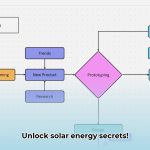Are you looking to significantly cut down on energy expenses and enhance your company’s sustainability profile? Energy Solar Tech (EST) offers scalable solutions. This comprehensive guide explores how EST assists businesses in achieving cost savings and improved efficiency through renewable energy solutions. From the initial design and construction of customized solar systems to proactive maintenance and navigating complex regulatory landscapes, we will explore their comprehensive strategy. Further, we’ll evaluate their strengths and potential drawbacks, compare them to key players in the competitive solar sector, and determine whether their integrated approach aligns with your specific business objectives for cost-effectiveness, enhanced energy efficiency, and long-term sustainability.
Understanding the Energy Solar Tech Business Model: A Paradigm Shift
In an era where sustainability intersects with profitability, how can businesses drastically decrease their energy bills while simultaneously enhancing their environmental stewardship? Energy Solar Tech companies offer a compelling solution through a fully integrated, end-to-end service model.
A Comprehensive Approach to Renewable Energy Solutions
Transitioning to solar energy with Energy Solar Tech involves much more than simply installing photovoltaic panels; it signifies adopting a comprehensive and strategically aligned approach where every phase, from initial consultation and bespoke system design to efficient manufacturing, flexible financing options, proactive maintenance protocols, real-time performance monitoring, and seamless navigation of regulatory complexities, is meticulously managed. This end-to-end integrated system streamlines the entire process for clients and optimizes overall efficiency. Clients gain the distinct advantage of having a dedicated point of contact for all their renewable energy needs, which is particularly attractive for businesses aiming to reduce their carbon footprint and simplify operations. Isn’t that a paradigm shift?
Breaking Down the Energy Solar Tech Process: A Step-by-Step Examination
Expert engineering principles and innovative design propel this effective system forward. Reputable energy solar tech companies develop uniquely tailored systems precisely adjusted to each client’s specific energy consumption patterns, geographical location, and business requirements. They often manage the in-house manufacture of mission-critical components, such as advanced electrical panels, high-voltage cells, and energy storage solutions. This “vertical integration” model guarantees high-quality components, ensures stringent quality control, and often translates into significant cost savings for the customer.
Next comes strategic financial planning and investment. Forward-thinking energy solar tech firms provide a suite of customized financial solutions that significantly lower upfront capital expenditure, making the transition to solar energy more economically feasible for a wider range of businesses. Consider it as a strategic lease arrangement or a power purchase agreement (PPA): the initial investment is strategically staggered over time, aligning with long-term budgetary goals and minimizing immediate financial impact.
Ongoing maintenance, real-time monitoring, and proactive performance optimization constitute vital aspects of the service ecosystem. Premier energy solar tech companies optimize system performance, enhance energy output, and proactively identify potential issues before they escalate, using cutting-edge technologies such as AI (Artificial Intelligence, enabling advanced predictive analytics), SCADA (Supervisory Control and Data Acquisition, providing real-time operational oversight), BMS (Building Management Systems, facilitating automated control and energy management), and IoT (Internet of Things) sensors, ensuring peak efficiency and minimizing downtime.
Finally, clients are relieved of the significant burden of navigating complex regulatory requirements. These specialized businesses expertly manage all necessary permits, diligently pursue available subsidies and incentives, and efficiently handle other bureaucratic procedures, saving their clients considerable administrative overhead, valuable time, and internal resources.
Demonstrating Real-World Impact: Case Studies and Success Stories
While specific client data is often proprietary, the benefits of partnering with an energy solar tech company can be illustrated through hypothetical scenarios grounded in real-world applications. Imagine a large manufacturing facility grappling with escalating energy costs, stringent environmental regulations, and the pressure to enhance its corporate social responsibility (CSR) profile. By partnering with an experienced energy solar tech business, the factory can expect to realize a multitude of tangible benefits: significantly lower energy costs, a dramatically reduced environmental impact, simplified regulatory compliance processes, minimized disruption to daily operations, and enhanced brand reputation. That’s the transformative power of a truly integrated and strategically aligned renewable energy solution.
Innovative Technology Driving Success: A Competitive Edge
To maximize energy efficiency, optimize performance, and ensure long-term reliability, leading energy solar tech companies leverage a diverse range of cutting-edge technologies and advanced engineering techniques. While precise technical specifications may vary depending on individual client needs and project scope, the focus generally remains on identifying innovative solutions to improve energy output, enhance energy storage capabilities, optimize grid integration, and minimize environmental impact. These businesses maintain their competitive edge in the rapidly evolving sector by consistently investing in research and development, fostering technological innovation, and proactively improving their systems.
Strengths and Weaknesses: A Balanced Perspective for Informed Decision-Making
Strengths:
- Integrated Approach: Streamlined project management, enhanced communication, and improved coordination are made possible by consolidated processes and a single point of contact.
- Deep Industry Experience: Clients benefit from well-established knowledge, proven expertise, and a wealth of experience accumulated over decades in the renewable energy sector.
- Comprehensive Service Offering: Companies typically handle every stage of the project lifecycle, from initial consultation, feasibility studies, and custom system design to professional engineering, efficient procurement, expert construction, ongoing maintenance, and seamless regulatory compliance.
- Positive Social Impact: Some businesses actively participate in global renewable energy initiatives, fostering sustainable development and contributing to a cleaner, more equitable future.
Weaknesses:
- Need for Independent Verification: While the claimed benefits are compelling, it’s essential to critically evaluate the efficacy of these solutions in diverse scenarios, considering variations in geographical location, climate conditions, and energy consumption patterns. Additional research, independent studies, and transparent performance data could provide more robust evidence and enhance credibility.
Navigating the Competitive Renewable Energy Market: Differentiation and Value Proposition
The renewable energy sector is characterized by intense competition, with numerous players vying for market share. Nevertheless, energy solar tech companies frequently distinguish themselves through their integrated service models, offering a holistic and client-centric approach that sets them apart from more fragmented providers. In a sector that demands dependable, efficient, and cost-effective renewable energy solutions, this comprehensive and strategically aligned approach offers a distinct competitive advantage, resonating with businesses seeking long-term value and sustainable partnerships.
Practical Risk Management Strategies: Ensuring Project Success and Minimizing Exposure
Energy solar tech firms encounter several potential risks, including unforeseen regulatory changes, rapid technological advancements that could render existing systems obsolete, fluctuating energy prices, and potential supply chain disruptions. To mitigate these challenges effectively and safeguard their clients’ investments, they frequently employ a combination of proactive and reactive risk management strategies, including:
- Flexible Contracts: Agreements that can be readily adjusted to accommodate system design modifications, accommodate evolving maintenance requirements, or incorporate technological upgrades as needed.
- Proactive Regulatory Monitoring: Continuous monitoring of evolving regulatory landscapes to ensure ongoing compliance and anticipate potential changes that may impact project feasibility or profitability.
- Strategic Research & Development: Consistent investment in research and development to ensure that their technologies remain cutting-edge, competitive, and aligned with emerging industry standards.
- Diversified Revenue Streams: Creating multiple income sources to reduce reliance on any single project, technology, or market segment, thereby enhancing financial stability and mitigating risk.
Illustrative Risk Assessment Matrix:
| Risk Category | Likelihood | Impact | Mitigation Strategy |
|---|---|---|---|
| Regulatory Changes | Medium | High | Proactive monitoring of regulatory developments; flexible contract design; strategic engagement with policymakers |
| Technological Advances | Low | Medium | Continuous R&D investments; technology upgrade options; strategic partnerships with technology providers |
| Market Competition | Medium | Medium | Superior service integration; long-term value propositions; proactive customer relationship management; strategic marketing and branding initiatives |
| Financial Instability | Low | High | Diversified revenue streams; sound fiscal planning; robust risk management framework; strategic partnerships with financial institutions |
| Supply Chain Disruptions | Low | Medium | Diversified supplier base; strategic inventory management; proactive monitoring of global supply chain dynamics |
A Look at the Future of Energy Solar Tech: Trends and Predictions
Given the escalating global demand for sustainable energy solutions, the long-term outlook for energy solar tech companies is exceedingly promising. As businesses increasingly prioritize environmental responsibility, strive to reduce operational expenses, and seek to comply with increasingly stringent environmental regulations, the demand for cost-effective, reliable, and sustainable energy solutions will continue to surge. Maintaining sustained success, however, will hinge on continuous innovation, unwavering adaptability to evolving market dynamics, proactive engagement with stakeholders, and transparent communication practices. Cleaner energy and a more sustainable future depend on this kind of development. What technologies, business models, and strategic partnerships are poised to shape the future of this rapidly evolving industry? Answering this complex question requires ongoing research, strategic foresight, and a deep understanding of the multifaceted forces driving the global energy transition.
Optimizing Business Energy Costs with Renewable Energy Outsourcing Solutions
Escalating energy costs can significantly erode business earnings and diminish overall profitability. What if you could substantially lower those expenses, improve your company’s sustainability profile, and enhance your competitive advantage—all at the same time? The answer lies in how to reduce business energy costs with renewable energy outsourcing.
The Power of Outsourcing Explained: Strategic Focus and Enhanced Efficiency
There are substantial benefits to strategically outsourcing various aspects of your renewable energy projects. Consider it as follows: you focus on your core business competencies, while specialized experts handle the complexities of solar panel installation, regulatory compliance, ongoing maintenance, and performance optimization. This streamlined approach frees up vital internal resources, minimizes administrative overhead, and enables you to concentrate on your main strengths, fostering innovation and driving growth
- How To Produce Power At Home Through Alternative Energy Systems - February 6, 2026
- How Can I Make Electricity At Home Using Renewable Energy? - February 5, 2026
- How To Generate Power At Home For Energy Independence - February 4, 2026
















